It’s possibly the question that I receive most: should I use salted or unsalted butter? Or: is it OK if I substitute salted butter for unsalted butter?
Today I want to talk about the differences in salted and unsalted butter, substitutions you can make if you only have one kind on hand (and it’s not the kind your recipe calls for), and why some recipes call for one type of butter over the other.
Until about two years ago, my inclination when baking was to always reach for the salted butter, no matter what the recipe said.
More salt = more flavor, right?
Well, no, not necessarily.
In fact, in nearly all of my recipes that I share here, I specifically call for unsalted butter.
So why is that? Well, there are several reasons, so, if you don’t mind reading over 500 words about my favorite fat, let’s discuss.
Salted vs. Unsalted Butter: What’s the Difference in Baking?
If you’re buttering toast or nestling a big hunk of butter on top of some steaming hot pancakes, you’re going to want to go with the salted butter, that will give you the best flavor in these situations.
However, when you’re baking, it’s a whole different story because we want to be able to control the amount of salt that we’re adding to our cupcakes, cookies, cakes, etc.
And that’s what it all boils down to: The reason that most baking recipes call for unsalted butter is because of the need for control.
When you use salted butter, it is very difficult (impossible?) to know for sure how much salt is being added to the recipe by way of the stick of butter.
Different brands use different amounts of salt in their butter, so unfortunately, you lose all of your control and run the risk of over-salting your recipe.
As a recipe developer, I put a ton of time into making the recipes that I share just right. I’ve optimized every ingredient with the goal of giving you the best flavor possible. Most other recipes that you’ll find across Pinterest and the web are fine-tuned the same exact way.
So, if a recipe calls for unsalted butter and a half teaspoon of salt, but you use salted butter and a half teaspoon of salt, you’re going to have a saltier dish than the recipe was actually designed for. Not more flavorful, but actually a worse result.
Carefully following what is called for in the recipe is the best way to ensure that you will get the best results possible

Freshness is a Factor
Unsalted butter is generally believed to also be fresher than salted butter.
The reason behind this is that since salt is a preservative, salted butter can be stored longer and may be older than your unsalted butter. In fact, it could actually be bad, or approaching going bad, but the quality would be masked by the salt.
For the best, freshest, flavor in baking, always use unsalted butter.
Unsalted Butter Substitute
But let’s say you’re set to bake some cookies, the recipe calls for unsalted butter, but you only have salted on hand. You’re already in your comfy pants after a long day at work and not about to run back out to the store, so what can you do?
While unsalted butter is always preferred when called for, there is a substitution: my general rule of thumb is to decrease the amount of salt that the recipe calls for by ½ teaspoon per cup of butter.
For example, if a recipe calls for 1 cup (or two sticks, or 227g for you metric users) of unsalted butter and 1 teaspoon salt, I would use 1 cup of salted butter and only ½ teaspoon of salt. If the recipe called for 1 cup of unsalted butter and ½ teaspoon salt, I would omit the salt entirely.
That’s ¼ teaspoon of salt per stick (113g) of butter.
Ideally, you want to use what the recipe calls for, but this subtle variation has never steered me wrong in the past.
Salted Butter Substitute
It’s less common that you’ll find a recipe that calls for salted butter when you only have unsalted on hand, but if you do, just apply the above steps backwards.
That is: for every 1 cup of salted butter that the recipe calls for, use 1 cup unsalted butter and ½ teaspoon salt, instead.
Super simple stuff, huh?
Ok so that’s it for today. In summary:
- Use the salt that the recipe calls for, when possible.
- Unsalted butter is most often used to give you more control over the salt content of the recipe and to maximize freshness and flavor without making your baked goods overly salty.
- If you only have salted butter and the recipe calls for unsalted, reduce the salt called for in the recipe by ½ teaspoon per cup of butter called for. This isn’t an exact science (remember, we aren’t sure how much salt is actually in salted butter), but it will produce best results.
Are there any other kitchen questions that you have that you’d like me to write about next? I have a few more planned but I’m happy to receive any suggestions!


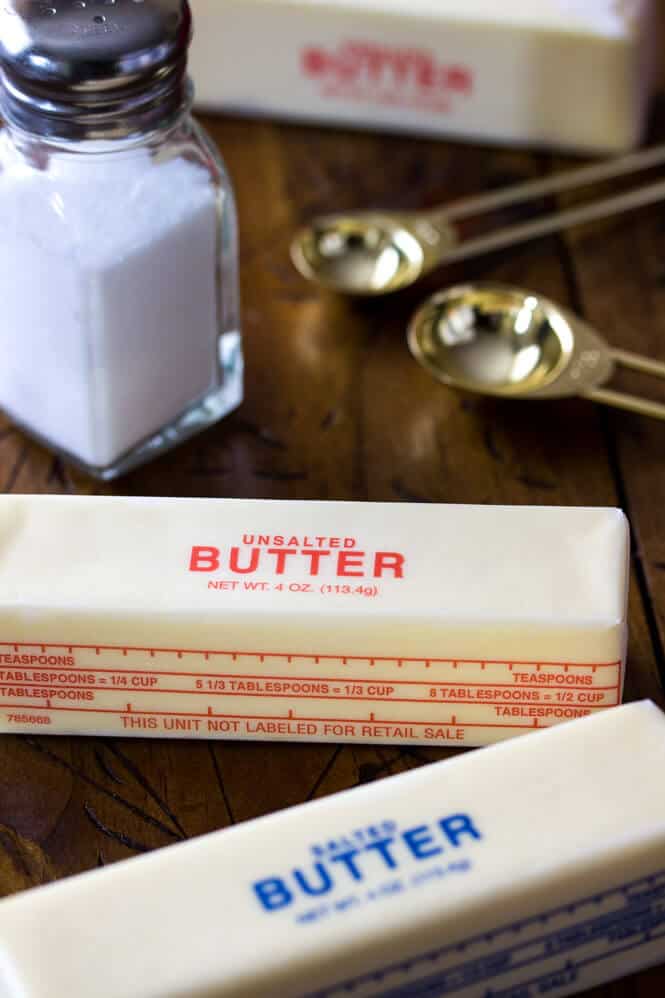
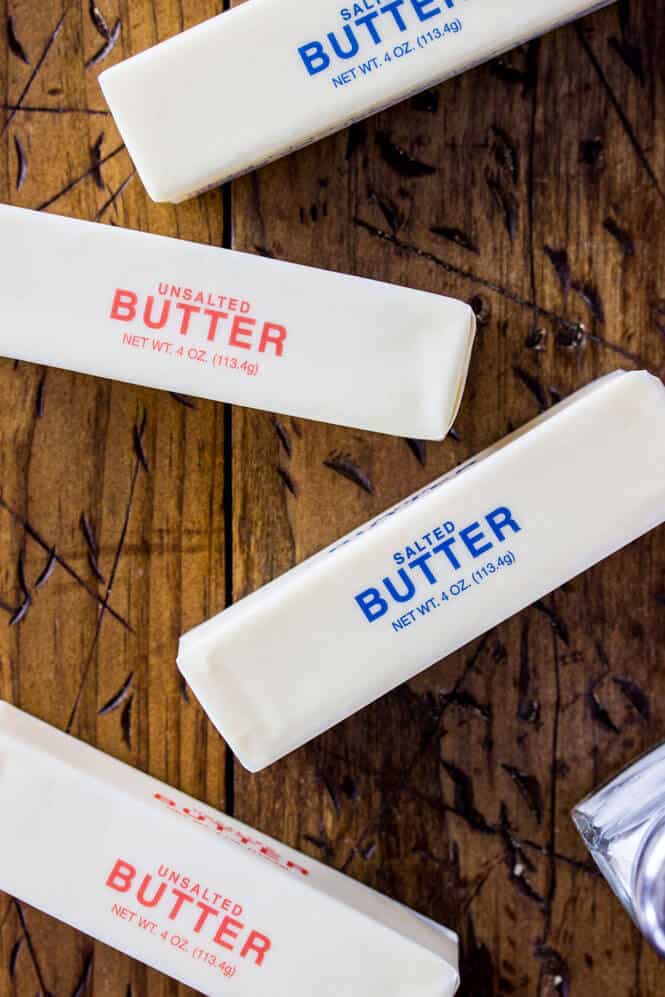
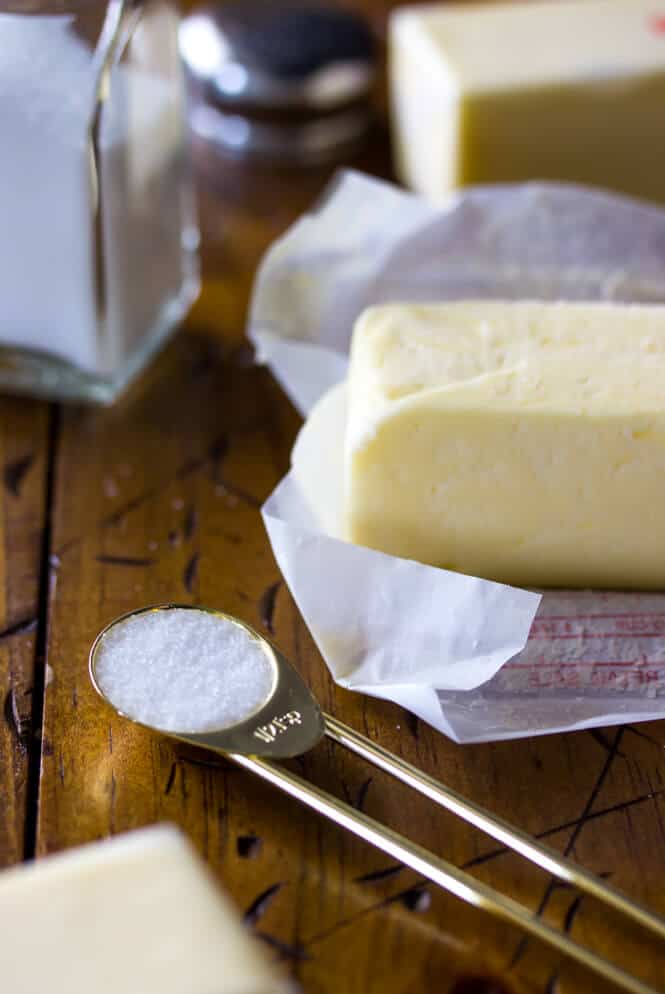
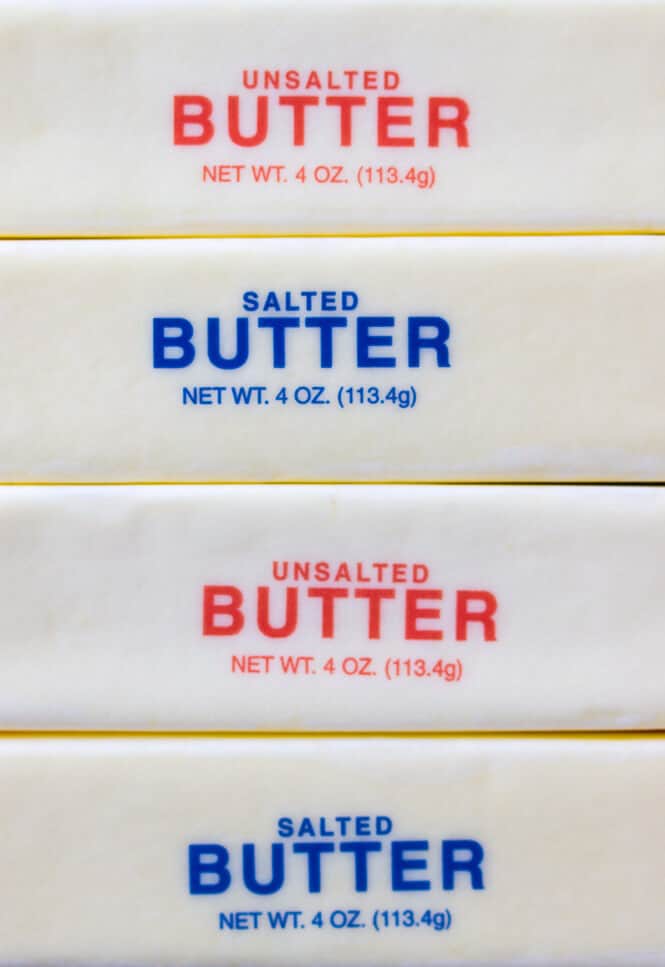
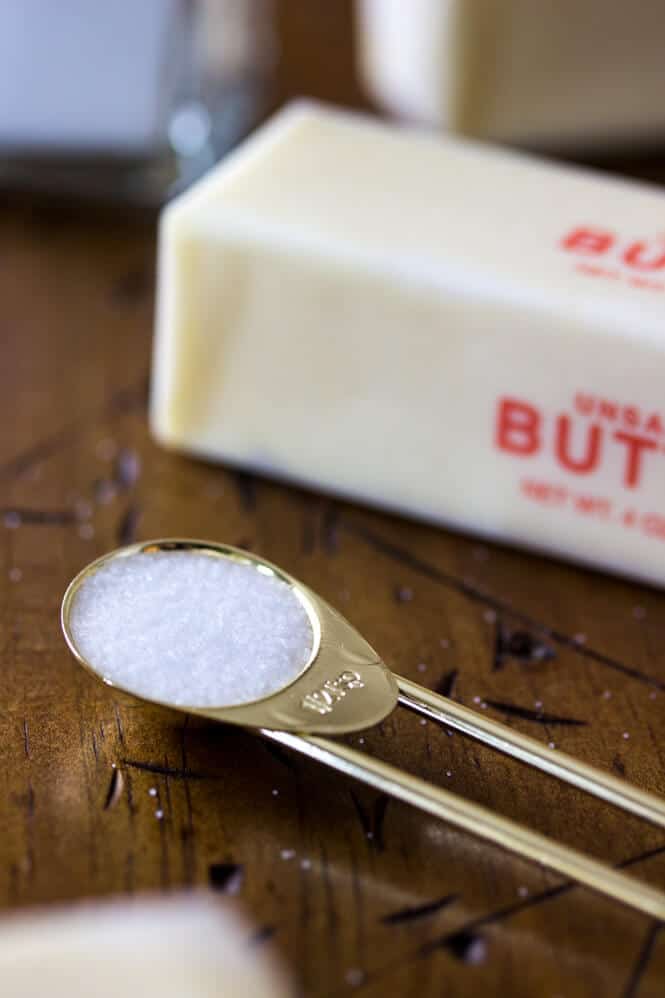
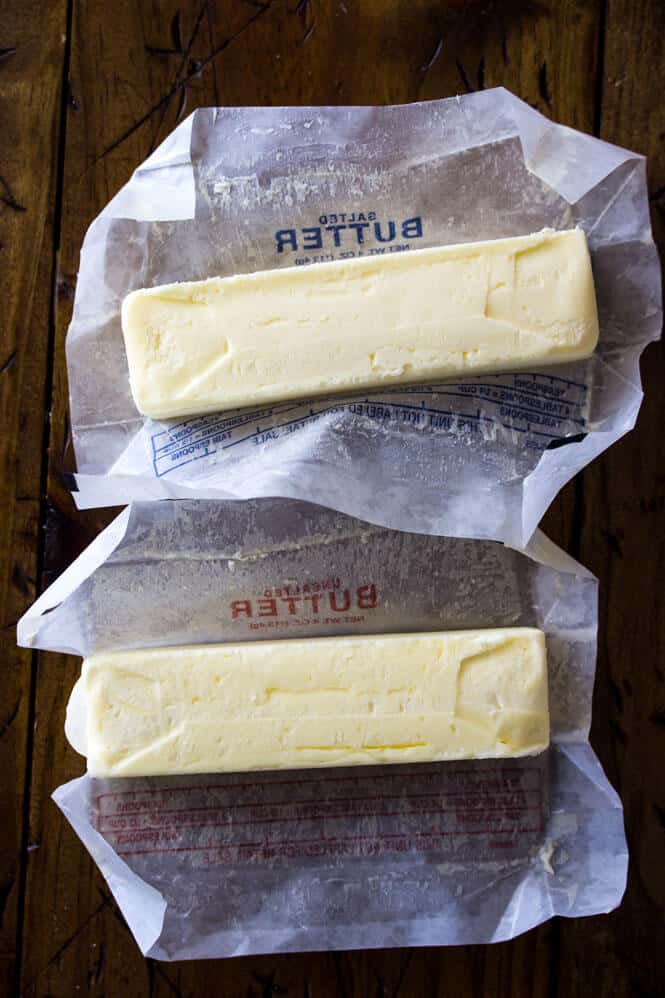
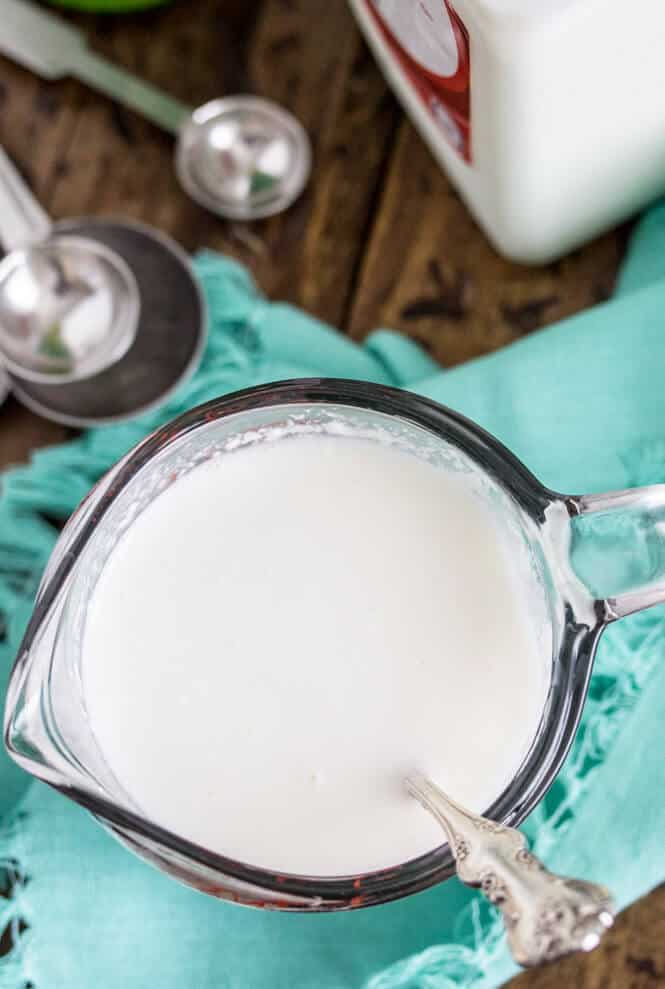
emily
This is something I’ve noticed and you may be able to verify and explain what’s happening. When I’m making pie dough or something like scones or biscuits I’ve noticed that salted butter gets soft sooner than unsalted butter as I’m cutting it into the flour. I always start with frozen pre-cubed butter so that part is the same, but the salted butter starts to soften before it’s fully cut-in. This results in a less flaky crust when cooked. I’ve learned to adjust and put dough in the refrigerator to re-chill before continuing cut-in. Sometimes the need to bake is too strong even if I don’t have unsalted butter at the time, LOL . Thank you, now I know salt adjustment amounts — I’ve always wondered. We fellow sweeth-tooths enjoy many of your recipes.
Sam
Hi Emily! I don’t work with salted butter too often but that is an interesting observation. I will have to try it out sometime and see if I notice the same thing. 🙂
Ellen
That is exactly what happened today. Butter thoroughly frozen, yet, softened while grating. And, I only had salty soooo, of course it was a wee bit saltier than expected. BUT…still delicious. I shaped by hand. Any thoughts on doing that rather than using a cutter.
Sam
Hi Ellen! My only caution in shaping it by hand rather than with any kind of cutter is that your hands are going to be much warmer than the cutter would be and that would warm up the butter as well. 🙂
Elizabeth
What if the recipe calls for ½ cup unsalted butter and ½ teaspoon salt.I only have salted butter do I use 1/4 teaspoon of salt or no salt at all?
Sugar Spun Run
Hi, Elizabeth! It really depends on the recipe. Most of the time I advise omitting the salt entirely.
Sherrie Swerbensky
I know that I am late to the party but I was wondering you ideas on doubling/tripling etc recipes and if you do the same thing for the baking powder/soda? I have heard mixed ideas about this.
(I hope that makes sense)
Thanks and have a blessed day,
Sherrie
Sam
Hi Sherrie! It really depends on the recipe if you want to be really particular, but generally yes you would double all ingredients in a recipe.
Shabnam
Thanks for the butter sticks photo(and weight in grams). It’s always annoying when recipes call for a stick of butter and no decimal person ever knows what that means! Now I know!
I get very fresh unsalted butter- but that means a trek to the shops. So I typically use salted butter an skip the added salt.
Sam
I’m so glad this was helpful for you, Shabnam. 🙂
Kaitlyn S
I NEVER paid attention to salted versus unsalted (we always have salted butter, never purchase unsalted) until I started baking and decorating sugar cookies. I made them several times, and they were great. I changed the brand of butter I used, added the salt, and they were way too salty. I traced it back to the butter, which I chose initially because it tasted better, but it tasted better because of the salt content. I always either use unsalted or cut the salt by half in the recipe.
Sam
It really makes a difference, doesn’t it!
Dhalia
Same here, we just always used salted butter but if I only have salted since I now follow many online recipes, and mainly use unsalted, then I’ll just omit the salt period. It doesn’t make that great a difference, salted or unsalted butter to me.
David Barnes
They add natural flavor to add flavor/preserve to the butter. It is soy and if avoiding soy, just use the salted butter. In fact everyone would be better off using the salted. The industry loads the cheapest ingredients in processed food
Sam
Hi David, could you please provide a source regarding soy in unsalted butter? Spreadable butter or margarine may contain soy, but this post is about butter that we would use in baking and I’ve just never heard of soy being added nor can I find any information backing that up.
Judy
Hi. I usually have salted butter on hand.. that being said I have to admit to never adding the salt to a baking recipe.. I just never wanted extra salt .. I might try it now to see if it changes the flavor… but only one time.. I also cut all sugar by 1/3. To 1/2 stated. Maybe why some things don’t rise as much.. TY for your article!!
Sam
I am glad you found it helpful, Judy! 🙂
Kelli
I’ve never considered any of this!! Thank you!!
Sam
You’re very welcome, Kelli! 🙂
Jill
Most recipes don’t specify if salted or unsalted butter is to be used. I emailed an author once to ask and she said that for baking if it’s not specified, assume it’s salted butter. Do others agree with this? Making Christmas cookies and is always a dilemma. Spritz which calls for a cup of butter and a 1/2 teaspoon of salt.
Patsy Noel
My recipe for sand tarts calls for unbleached all purpose flour and no salt. So would it be okay to use salted butter? For some reason that is all I have in my fridge and my son wants to help or even bake the sand tarts today. He’s an adult and just wants to take the work off me. Sand tarts are a tiring chore but are very good and my men love them. Thank you for your information.
Sam
Hi Patsy! Since I don’t have the exact recipe in front of me I can’t honestly say for sure. If the recipe doesn’t specify whether you should use salted or unsalted butter and it doesn’t call for salt I would think you would be fine to use salted butter.
Aly
Hey. My biggest issue with unsalted butter is the ingredients. If you can find me a brand that makes unsalted butter without the “natural flavor” I’d gladly use unsalted. Only salter butter has the 3 ingredients butter should have. Butter cream and salt. If you know about FDA standards of the term “natural” you would opt for salted butter. Have you ever tasted the difference? Especially in that cheapy brand you’re using. The flavor is so So bad. I bake ALL the time and constantly receive compliments. Never complaints of too much salt. This is America come on.
Sam
The natural flavor is for shelf stability, which salted butter doesn’t need added because it contains salt (a preservative). After years of experimenting and taste testing (verified “super taster” here), I stand by my recommendation of using unsalted and adding salt, but I am glad your way is working for you 🙂
Also if you’re referring to the brand of butter used in my photos here, I chose a generic butter so as to not promote a specific brand in this post.
Clint
Aly, your arrogance and skill at being judgmental is as powerful as you deem the butter brand Sam has photographed is bad.
Afterall, this is America, come on!!!
Kelly
Thank u for ur eloquence of words In putting this commenter in her place I was utterly shocked at the level of rudeness being hurled at this sweet blogger who is only giving us her honest and well earned professional recommendation ITS ONLY SALT for heavens sake I was tempted to leave a super rude reply then read ur comment and was swiftly calmed down and just wanted to say THANK U!
deborah donnelly
Thank you .I use salted butter everyday & cut back on salt or cut it out& not devoted to one kind .Its whatever is on sale when I need it .At the moment its on for $2.99 here in Canada .That saves me $1.25 per pound I am happy,
Liz
What about when the recipe doesn’t specify salted or unsalted butter?
Sugar Spun Run
Hello, Liz! Typically in my recipes if its not specified I use unsalted better. 🙂
Suzzanne
Well I’ve baked all my life and I use that butter, if you like to spend money, use what you want, but in baking it all taste the same.
OH I live in America!
Michelle Walker
Now that we have covered the know how about butter, all about light brown sugar vs. dark brown sugar. Most recipes don’t really clarify which to use.
Sam
Great idea, I will work on a post about that, thank you for the idea! Usually if the recipe doesn’t specify I just default to/assume they mean light brown sugar
Honey
Thanks so much for the information didn’t know exactly what the difference was between the two, it was very helpful.
Sam
I’m very glad that you found it to be helpful! 🙂
Suzzanne
I’m very glad I found you and your recipes. Just made the yellow cake and chocolate frosting. I was going to say icing but that would tell you my age! Thank you for what you do!
Sugar Spun Run
I am so glad that you found my blog too and that you enjoyed the first recipe that you tried, Suzzanne! Thanks for commenting. I can’t wait to see what you try next. 🙂
Christine
Thank you for taking on this topic! About 20 years ago I came across my first recipe that specified the use of ‘unsalted butter’. Before then, I never knew ‘unsalted butter’ existed. But, it made logical sense, as the recipe was for homemade Birthday cake and frosting from a famous bakery in NYC. Honestly, salt in fresh, homemade buttercream frosting does sound grose. I have never used ‘salted’ butter since when baking! If recipes do not state salted vs. unsalted, I opt for unsalted. Nicely worded blog post. 🙂
Lisa
Awesome! Awesome!!! I have always wondered about this!!! It’s like you read my mind! This was so helpful as this exact situation happened to me last weekend when I was making banana bread. I only had salted and I omitted all the salt and it didn’t come out as good. Now I know. Thanks Sam – love your tips and recipes.
Sam
Woohoo! So glad ou found it to be helpful, Lisa! 🙂
Thank you for commenting, I’m glad you enjoy the blog!
Mary Beth
Thanks for the tip! I usually use salted butter and sometimes omit the added salt. I don’t really notice a difference but I’ll try this next time. The only time I’ve had a recipe turn out way to salty is if I use salted nuts!
Sam
I’m so glad that you found it helpful, Mary Beth! Thank you for commenting! 🙂